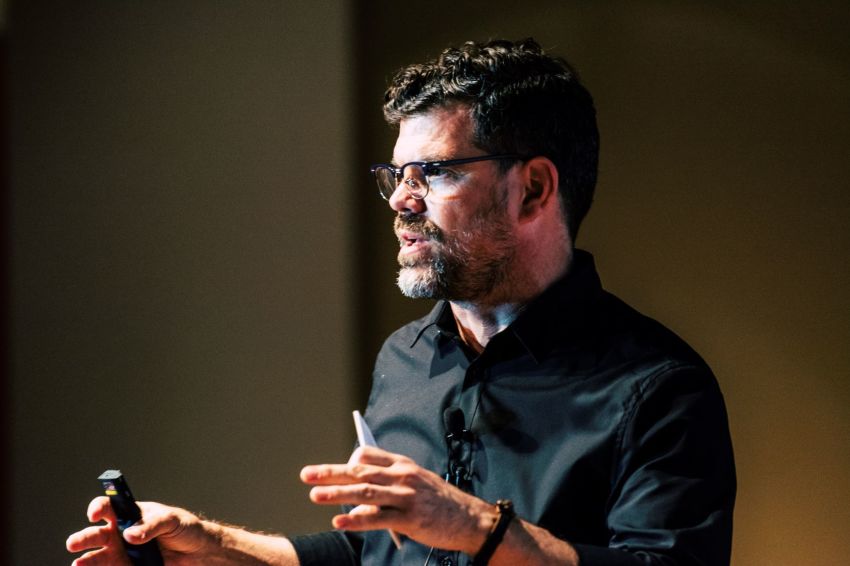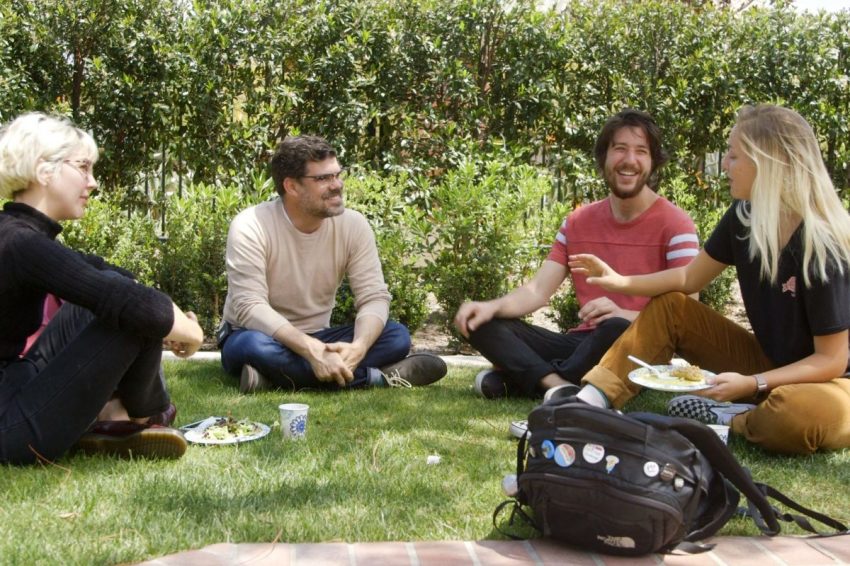Former pastor Ryan Bell on why he abandoned his Christian faith: I gave it my best shot

Ryan J. Bell, former pastor of the Hollywood Adventist Church in California, launched an experiment to live without God on New Year’s Eve in 2013 after preaching for 20 years. A year later, he concluded that God did not exist. Five years into that decision, he admits that for a while he missed Christianity, but not anymore.
The decision to abandon his faith cost him dearly in the beginning. He lost his job at two Christian universities and found himself struggling to make ends meet at one point. He recently responded to some questions from The Christian Post about his life after Christianity and how he now feels about his lost faith.
CP: You served as a pastor for 20 years and taught at two Christian universities before concluding about five years ago, after a one-year experiment of life without God, that the basis of your faith in God wasn’t true. How have you been? How has life changed for you in the last five years?
Bell: I'm well. The transition was not without its challenges. Honestly, the most dramatic change was in my career. All of my education and experience was in Christian theology and ministry so when I was dismissed from the church I didn't have a degree or vocation to fall back on. I went through several years of periodic unemployment and underemployment, resulting in mounting debts. But today I'm on much more solid footing and beginning to tackle my debts.
CP: Was it difficult to give up Christianity?
Bell: It wasn't that difficult. My beliefs had been shifting for many years. I started out as a very conservative Christian and ended as a very progressive Christian, albeit still in a conservative denomination. I sometimes say it was like whittling a stick — cutting away little bits, shaving off rough edges — and I kept at that project until one day I looked down and there was no stick left.
Another way to think about this is that conservative Christianity is a very bounded community. There are clear markers of who is in and who is out. Part of the theological and ministry project I found myself a part of was widening that community to include more people and a broader analysis of politics. Eventually, it widens so far that it includes everyone and at that point, I didn't feel the need for Christianity, per se. It was just the human family.
CP: Do you ever sometimes miss being a Christian?
Bell: Not anymore. In the beginning, I missed the rhythm of the year and the way Christianity helped me mark time. I missed the community I was a part of, to a certain extent, but I was also burned out on the community — constantly caring for a community, nurturing it, giving to it. It's a Sisyphean task in some ways and I was relieved to be done with it. I used to miss the positive eschatological narrative, captured by popular sayings like "Love wins" and "Everything will be OK in the end. If it's not OK, it's not the end." But now that just seems hopelessly naive to me.
CP: How do you describe yourself now? Would you call yourself an atheist?
Bell: There's no one identity that perfectly captures how I think of myself today. I am an atheist, for sure, but there's so much more to me than that. I'm a humanist in the sense that I don't believe anyone is coming to save us. We are the ones we're waiting for. I'm also a democratic socialist, which describes how I understand politics. My humanism and my democratic socialism go hand in hand. I can't separate existential questions about meaning and value from political questions about who has access to a materially good life.
CP: In recent months, we have seen prominent Christian leaders, such as writer and former pastor Joshua Harris, publicly renounce their Christian faith or express doubts about it. Do you think this trend is being driven by the current secularization of American culture?
Bell: The short answer is, yes, I think there is probably a positive feedback loop of some sort at work here. Secularization is driven by people determined to live their lives out from under old norms that turned out to be very exclusive and harmful to large swaths of the population. That secularization, in turn, encourages others to step out and live their lives with integrity and authenticity. If we take secularization to mean the de-religionization of America, then I think this means people are increasingly comfortable re-evaluating their ethics without reference to religion. People like Joshua Harris have done incredible harm to people by telling them that who they are isn't trustworthy or good. When you start to see the falsehood of that narrative come to life in the lives of the people you've influenced then yeah, that's either going to force you to question the foundations of your belief system or it will force you deeper into denial. Thankfully (from my perspective), Mr. Harris has chosen the path of integrity.
CP: There has been some handwringing among the faithful as to what is driving the growing apostasy among Christians. What was the exact moment for you, despite all your experience with Christianity that you began to doubt?
Bell: There wasn't one exact moment, but there were a series of moments. One was developing a personal friendship with a member of my church who was gay. That led me on a years-long project of trying to figure out what the Bible said about homosexuality. The idea that the Bible may have gotten this wrong was a big moment for me. September 11, 2001, was also a turning point. It was in the immediate aftermath of 9/11 that it struck me that people of other religions also believe God is commanding them to do things, things I thought were unspeakably evil, which led me to recall the things that my people — Christians — have done and continue to do in God's name that are unspeakably evil. That was the beginning of me wondering whether religion is just a belief system that people use to justify their perceived supremacy. From that initial wake-up call, I started getting involved in a lot more ecumenical and interfaith dialogues and that further relativized my beliefs.
CP: What would you say to Christians concerned about people leaving the faith?
Bell: I would encourage them to maintain authentic relationships with those who are leaving, where possible, and listen deeply to their critiques of Christianity. Open your sacred beliefs up to critique because if they're true, they should be able to withstand that examination. If they're not true, well ... don't you want to believe true things? I'd also say that if there is a demonstrable value in Christian religion it is the community and opportunity to work together to serve your community. Focus on that.
I'd also encourage folks to try to understand that those who are leaving are in pursuit of truth. They're not in open rebellion, as I sometimes hear Christians say. The same thing that led many people to Christianity (the pursuit of truth) has led many out of it. Perhaps that's something we can share in common.

CP: You are now the national organizing manager at Secular Student Alliance. Can you tell me about that work?
Bell: The Secular Student Alliance supports and resources student leaders across the United States in 300+ chapters on high school, college and university campuses. Our chapters are quite diverse but in general, they are supporting communities for those who are not religious or who are questioning their faith. The goal is to provide a space where students can have open and honest conversations about difficult topics, including issues related to religion. Our chapters also work in areas where Christianity has been especially harmful to people: LGBTQ equality, reproductive justice, climate action, and other science-related topics. Many of our chapters also cultivate strong interfaith relationships on their campus in an effort to increase understanding among different groups, break down stigmas and end discrimination and bullying.
CP: Do the students ever ask you about your journey through Christianity? What do you normally tell them?
Bell: They do. I tell them more or less what I've told you: that I started out in a very Christian family, in the Seventh-day Adventist Church. Over time I opened my theology and church ministry to include more and more people. My motivation for doing that was Jesus, to be honest. I saw this kind of rule-breaking, inclusive ministry as exactly the sort of thing Jesus did in the gospels and which ultimately led to His crucifixion. In the end, the church no longer accepted me as a faithful adherent. It was in the aftermath of leaving the church that I began to examine the historical and philosophical foundations of my faith tradition more closely. The end result of that was that I didn't see any reason to live my life as though there was something supernatural going on. I gave it my best shot and I found that I was much happier and more integrated as a person if I lived on the basis that the natural world is all there is.
CP: Is there anything else that you would like to say about why Christians abandon their faith?
Bell: Most Christians abandon their faith because they find out it isn't true or at least after examining it more closely can no longer believe it's true. It's also the case that the church has been, and continues to be, very hurtful to a great many people, but that is not why people leave their faith, in my experience. I have found that people very often cling to their faith in spite of abusive churches and church leaders. But when a person undertakes to examine the veracity of the Bible and evidence for a divine being that intervenes in the world, what one finds, more often than not, is silence. There are, of course, ways to theologize about this silence. I know those theologies well. But for many people, the mental gymnastics finally becomes more tiresome than just living one’s life based on the realities at hand.



























